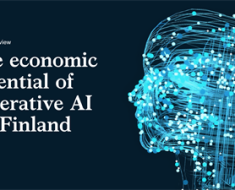As you grow your company’s global footprint and reach out to new audiences, the importance of website localization becomes more apparent. Localization not only provides a consistent user experience but also opens up new markets and opportunities.
If you want your company to remain relevant, you must go beyond current technologies and anticipate future trends.
In this article, we will discuss how artificial intelligence (AI) and machine learning (ML) transform the translation and localization industry.
Why Should You Future-Proof Your Website?
As an entrepreneur, you should consider future-proofing your website using machine learning and AI translation for the following reasons:
Global reach and market expansion
Future-proofing your website through ML and AI-powered localization helps you reach a global audience by adapting your website content to different languages and cultures. This opens up new markets and opportunities for business growth.
Credibility and trust
A localized website shows that you’re committed to serving diverse audiences. Users are more likely to trust a website that speaks their language and understands their cultural nuances.
Competitive advantage
It is important to be competitive in a globalized economic climate. Localizing your website can give you a competitive advantage by catering to the individual needs of target consumers.
This sets you apart from competitors who may not have adapted their content.
Compliance with local regulations
Some regions have specific legal and regulatory requirements regarding website content. Localizing your website helps ensure compliance with these regulations, avoiding potential legal issues and penalties.
What’s the Role of AI and ML in Website Localization?

Artificial Intelligence (AI) and Machine Learning (ML) are powerful tools that help streamline and enhance the website localization process. This provides entrepreneurs with the solutions they need to efficiently connect with a broader audience.
Some of the roles of AI and ML in website localization include:
Automated translation
Traditional translation processes are time-consuming and costly. AI-powered machine translation, on the other hand, offers automated and real-time translation services.
Localization tools like Centus leverage neural networks and ML algorithms to understand context and deliver more accurate translations.
Entrepreneurs can use this tool to instantly translate website content into multiple languages, thereby ensuring that their message is clear and culturally relevant to their target audience.
Content personalization
AI and ML can analyze user behavior, preferences, and demographics to personalize website content.
Entrepreneurs can leverage this benefit by adapting their websites to suit the preferences of their audiences. This ensures that users from different regions see content that is not only translated but also tailored to their cultural nuances.
User experience optimization
AI algorithms can analyze user interactions with a website. As a result, they can recognize patterns in navigation and behavior.
This information can be used to optimize the layout, structure, and navigation of the website for different user segments.
SEO (Search Engine Optimization)

AI-driven SEO tools can help you optimize your websites for local search engines. These tools analyze search patterns and user behavior, providing insights to refine keywords, meta tags, and content structure.
This ensures that the localized websites rank higher in local search results, thereby attracting more organic traffic from specific regions.
Continuous improvement
ML algorithms can continuously learn and adapt based on user feedback and changing market trends. This can help you refine your localization strategies over time so that your digital presence remains relevant for your audiences.
Practical Steps for Entrepreneurs
As an entrepreneur who wants to future-proof their website via effective localization powered by AI and machine learning, you need to follow a strategic approach. Here are steps to guide you through the process:
Conduct a comprehensive localization audit
Assess your current localization efforts. Identify the languages and regions your website targets and evaluate the effectiveness of your existing strategies.
Determine if your current approach aligns with the preferences and behaviors of your target audience in different regions.
Define your localization goals
Clearly outline your business goals and expectations from website localization. Consider factors such as increased user engagement, expanded market reach, and revenue growth.
Align your localization goals with broader business strategies to ensure a cohesive and impactful approach.
Research and choose the right AI-powered localization tools
Explore the diverse range of AI and machine learning tools available for website localization. Consider factors such as translation accuracy, adaptability to diverse content types, and scalability before choosing any tool.
Also, choose tools that seamlessly integrate with your existing infrastructure and are tailored to your business needs.
Implement a scalable localization workflow
Develop a scalable workflow that will be suitable for the nature of your business. Ensure that the AI tools you choose can adapt to evolving content requirements and user preferences.
Integrate AI-driven automation to streamline processes and reduce manual intervention so that your team can focus on strategic aspects.
Regularly monitor and analyze performance
Leverage analytics tools to gain insights into user behavior, engagement metrics, and conversion rates. Regularly review data to identify areas for improvement and fine-tune your localization strategy based on real-time feedback.
Conclusion
Website localization plays a key role in reaching global audiences and enhancing user experiences. Entrepreneurs who are interested in sustainable growth need to consider integrating AI and machine learning into localization tools.
The benefits of integrating AI and ML into website localization are numerous, from improved accuracy and efficiency in language translation to dynamic content adaptation based on user behaviors.
These technologies deliver real-time analytics, allowing entrepreneurs to make more informed decisions and expand their reach. Furthermore, the affordability and scalability of these technologies make them accessible and viable options for organizations of all sizes.
Looking ahead, entrepreneurs need to stay informed about emerging trends in AI and machine learning for localization.





